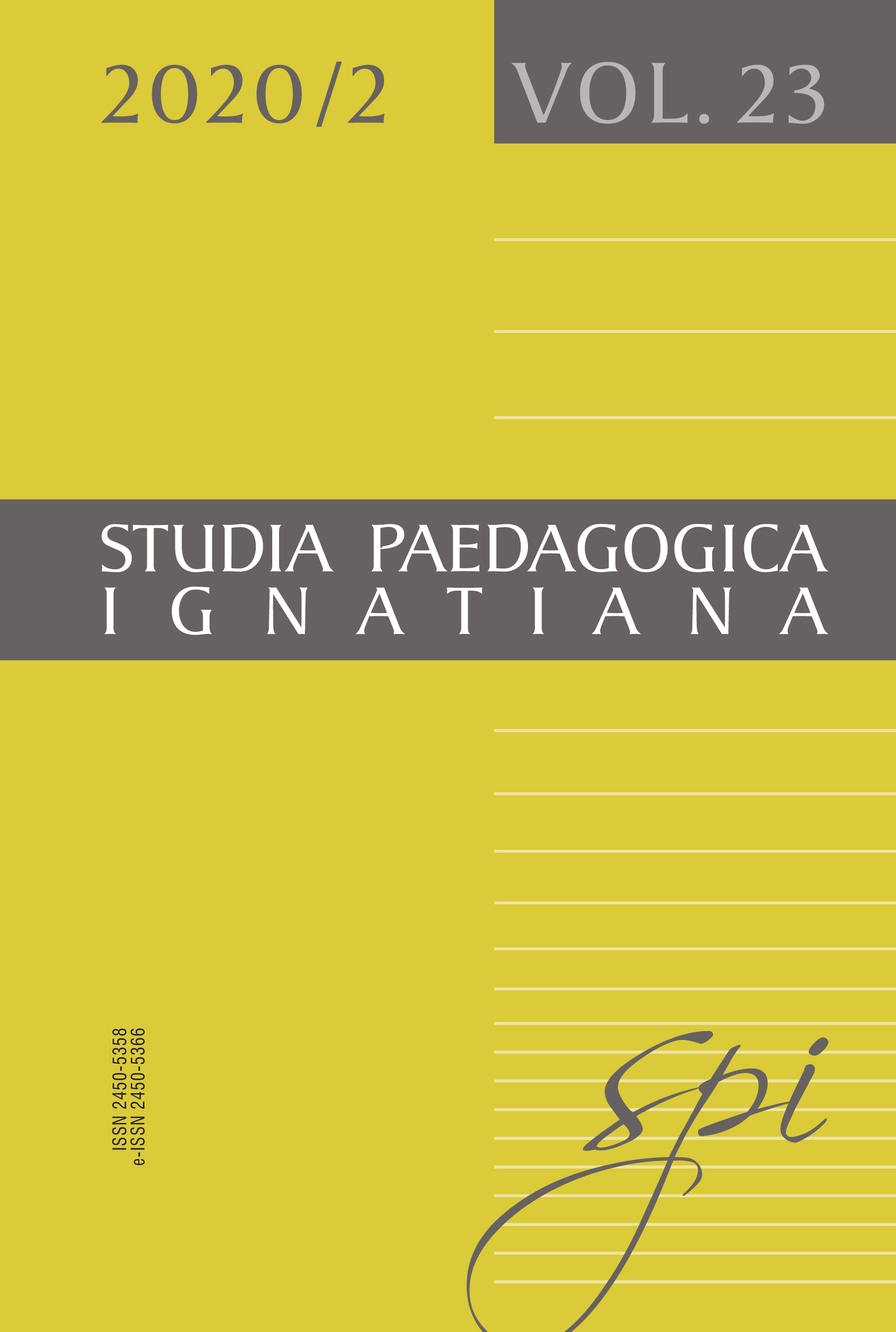Przestrzenie aktywności nauczyciela akademickiego i studenta w świetle dydaktyki zaangażowanej
DOI:
https://doi.org/10.12775/SPI.2020.2.006Słowa kluczowe
zaangażowanie, dydaktyka zaangażowana, osoba, aktywność nauczyciela akademickiego, aktywność studentówAbstrakt
Celem przedstawionego opracowania jest ukazanie specyfiki integracji aktywności nauczyciela akademickiego i studentów pedagogiki/przyszłych nauczycieli. Punktem odniesienia przedstawionych analiz jest dydaktyka zaangażowana, u podstaw której znajdują się integracja sfery poznawczej/intelektualnej i aksjologicznej z osobowościową, zmiana prorozwojowa w perspektywie podmiotowości, autonomii twórczości podmiotów kształcenia akademickiego, zwłaszcza studentów w perspektywie integracji.
W dydaktyce zaangażowanej kluczowym pojęciem jest zaangażowanie, które jest rozumiane jako pewien typ praktyki dyskursu badawczego uwzględniającego przede wszystkim potrzeby emancypacyjne konkretnych grup osób. Badacze uczestniczący w tym dyskursie angażują się w projekty, których celem jest zmiana społeczna, a nie tylko poprawa położenia defaworyzowanych podmiotów. Natomiast istotą i warunkami brzegowymi tej praktyki jest poczucie podmiotowości zarówno samych badaczy, jak i uczestników sytuacji społecznych, którzy w sposób dobrowolny i z poczuciem satysfakcji uczestniczą w tego rodzaju działaniach.
,,Dydaktyka zaangażowana” określana jest jako typ podmiotowych działań dydaktycznych nauczyciela akademickiego i studentów, o charakterze zmian prorozwojowych budowanych dzięki komunikacji interpersonalnej, wzajemnemu zaufaniu, służbie, wyzwalających twórczą aktywność. Podstawę tych działań stanowi integracja zdobywanej przez studenta wiedzy, orientowana na integralny rozwój osoby w jej wymiarze jednostkowym i społecznym. Perspektywą działań nauczyciela akademickiego i studentów jest integralny rozwój ucznia jako nadrzędnego celu szkoły i optymalizacja warunków jego realizacji.
Bibliografia
Adamski F. (2005). Wprowadzenie. Personalizm – filozoficzny nurt myślenia o człowieku i wychowaniu, [w:]: F. Adamski (red. ), Wychowanie personalistyczne. Wybór tekstów, Kraków: Wydawnictwo WAM, s. 9–15.
Bereźnicki F. (2001). Dydaktyka kształcenia, Kraków: Oficyna Wydawnicza „Impuls”.
Červinková H., Gołębniak B.D. (2010). W poszukiwaniu emancypacyjno-transformacyjnego wymiaru badań pedagogicznych i antropologicznych, [w:] H. Červniková, B.D. Gołębniak (red.), Badania w działaniu. Pedagogika i antropologia zaangażowane, Wrocław: Wydawnictwo Naukowe Dolnośląskiej Szkoły Wyższej, s. VII–XVII.
Chałas K. (2019). Dydaktyka akademicka w uniwersytecie katolickim, t. 1: Dydaktyka zaangażowana – z doświadczeń Katedry Dydaktyki i Edukacji Szkolnej KUL, Lublin: Wydawnictwo KUL.
Cybal-Michalska A. (2018). Rozwiązywanie problemów natury tożsamościowej w świecie różnorodności i wielości możliwości, [w:] M. Czerepaniak, J. Madalińska-Michalak, B. Śliwerski (red.), Ku życiu wartościowemu. Idee – koncepcje – praktyki, t. 1: Idee – koncepcje, Kraków: Oficyna Wydawnicza „Impuls”, s. 125–146.
Krąpiec M. (2005). Człowiek – dramat natury i osoby, [w:] F. Adamski (red.), Wychowanie personalistyczne. Wybór tekstów, Kraków: Wydawnictwo WAM, s. 23–40.
Tuohy D. (2002). Dusza szkoły. O tym, co sprzyja zmianie i rozwojowi, przeł. K. Kruszewski, Warszawa: Wydawnictwo Naukowe PWN.
Witkowski L. (2010). Tożsamość i zmiana. Epistemologia i rozwojowe profile w edukacji, Wrocław: Wydawnictwo Naukowe Dolnośląskiej Szkoły Wyższej.
Pobrania
Opublikowane
Jak cytować
Numer
Dział
Licencja
Autor zgłaszając swój artykuł oświadcza, że:
jest Autorem artykułu (zwanego dalej Utworem) i:
- przysługują mu wyłączne i nieograniczone prawa autorskie do Utworu,
- jest uprawniony/a do rozporządzania prawami autorskimi do Utworu.
Udziela Uniwersytetowi Ignatianum w Krakowie nieodpłatnej, niewyłącznej, nieograniczonej terytorialnie licencji do korzystania z Utworu na następujących polach eksploatacji:
- utrwalania utworu w formie papierowej, a także na nośniku cyfrowym lub magnetycznym;
- zwielokrotnienia utworu dowolną techniką, bez ograniczenia ilości wydań i liczby egzemplarzy;
- rozpowszechniania utworu i jego zwielokrotnionych egzemplarzy na jakimkolwiek nośniku, w tym wprowadzenia do obrotu, sprzedaży, użyczenia, najmu;
- wprowadzenia utworu do pamięci komputera;
- rozpowszechniania utworu w sieciach informatycznych, w tym w sieci Internet;
- publicznego wykonania, wystawienia, wyświetlenia, odtworzenia oraz nadawania i reemitowania, a także publicznego udostępniania utworu w taki sposób, aby każdy mógł mieć do niego dostęp w miejscu i czasie przez siebie wybranym;
- w zakresie praw zależnych do Utworu, obejmujących w szczególności prawo do dokonania koniecznych zmian w Utworze, wynikających z opracowania redakcyjnego i metodycznego, a także do dokonania tłumaczenia Utworu na języki obce.
Udzielenie licencji następuje z chwilą przekazania Utworu na rzecz Uniwersytetowi Ignatianum w Krakowie. Uniwersytet Ignatianum w Krakowie jest uprawniony do udzielania dalszych sublicencji do Utworu, w zakresie udzielonego prawa. Licencja jest ograniczona czasowo i zostaje udzielona na okres 15 lat, licząc od daty jej udzielenia.
Polityka prywatności
Statystyki
Liczba wyświetleń i pobrań: 806
Liczba cytowań: 0



